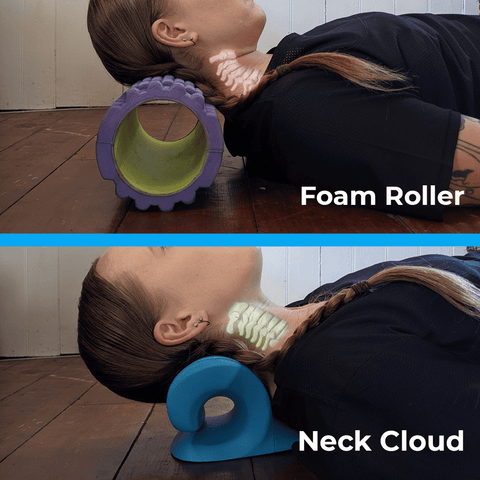Improve Your Stance and Decrease Neck Discomfort with the Neck Cloud
Improve Your Stance and Decrease Neck Discomfort with the Neck Cloud
Blog Article
The Effect of Tension on Neck Pain: Strategies for Lowering Stress and Pain
In today's busy globe, it's no secret that stress has actually come to be a common factor in the start and worsening of neck pain. Join us on a trip to untangle the effect of anxiety on neck pain and discover efficient ways to alleviate pain and enhance total high quality of life.
Recognizing Stress-Related Neck Pain
Stress-related neck pain can materialize as tension, tightness, or pain in the neck and shoulder location. The link between stress and neck pain lies in the body's physiological response to tension, which can result in muscular tissue stress and rigidity in the neck muscular tissues.

Identifying Common Stress Areas
Frequently experienced by individuals under stress and anxiety, stress locations in the body can provide beneficial understandings into the physical indications of psychological pressure. One usual stress area is the neck, where stress commonly shows up literally. Stress migraines, stiff neck muscle mass, and limited variety of motion prevail symptoms of stress-related neck tension. The shoulders are one more typical area where stress collects. Stress and anxiety can cause the muscles in the shoulders to tighten up, resulting in discomfort and pain. Furthermore, the top back is prone to tension accumulation, especially in people that experience persistent stress. Poor stance and prolonged sitting can aggravate tension in this field. The jaw is likewise a typical place for stress-related stress, as many individuals clinch their jaw or grind their teeth when emphasized. Knowing these common stress areas can help people recognize the physical indicators of stress and anxiety and take steps to address them before they intensify into persistent pain or discomfort.
Carrying Out Relaxation Techniques
To efficiently take care of stress-related tension in the body, applying leisure methods is important. Leisure methods are useful tools for lowering neck pain triggered by anxiety. Deep breathing workouts can help soothe the mind and kick back stressful muscle mass in the neck and shoulders (neck cloud). Exercising mindfulness meditation can additionally be useful in minimizing anxiety and advertising relaxation. Progressive muscle relaxation, where you methodically stressful and afterwards relax different muscular tissue teams, can release built-up tension in the neck area. In addition, tasks like yoga and tai chi include see this here both physical activity and relaxation, making them reliable practices for decreasing stress and anxiety and neck discomfort. Taking regular breaks throughout the day to stretch and unwind can protect against muscular tissue rigidity and tension from collecting. By including these relaxation techniques right into your everyday regimen, you can help take care of anxiety degrees, reduce stress in the neck, and reduce pain related to stress-induced neck pain.
Integrating Self-Care Practices
Including self-care techniques is necessary for keeping general well-being and handling stress-related neck pain successfully. Engaging in regular physical activity, such as gentle extending workouts or yoga exercise, can help reduce go to my site tension in the neck and shoulders. Exercising excellent pose throughout the day and taking frequent breaks from extended resting or screen time can also avoid strain on the neck muscles.
Furthermore, focusing on adequate rest and developing a regular sleep regimen can contribute dramatically to minimizing stress and anxiety levels and advertising relaxation. Producing a relaxing going to bed regimen, such as checking out a publication or taking a cozy bathroom, can help prepare the body and mind for relaxing sleep. In addition, maintaining a well balanced diet plan rich in nutrients and staying moisturized can sustain overall wellness and reduce swelling that might aggravate neck discomfort.
Incorporating mindfulness methods, such as deep breathing workouts or reflection, can assist handle tension and promote relaxation. Requiring time for oneself, participating in hobbies, and setting boundaries to protect individual time are additionally vital elements of self-care that can add to minimizing tension and reducing neck pain.
Seeking Professional Aid
Exactly how can people successfully deal with relentless neck pain that is influencing their daily life and health? Seeking professional help can be a critical step in handling and minimizing neck discomfort.
Chiropractics physician focus on spine control methods to boost official source alignment and minimize tension in the neck area. Physiotherapists provide targeted stretches and workouts to reinforce muscle mass, enhance versatility, and improve general neck function. Orthopedic experts can provide innovative clinical treatments such as injections or medical options for extreme situations of neck discomfort.
Final Thought

Stress-related neck discomfort can materialize as stress, tightness, or discomfort in the neck and shoulder location. The link between anxiety and neck pain exists in the body's physiological reaction to stress and anxiety, which can result in muscular tissue stress and tightness in the neck muscles. Stress headaches, stiff neck muscle mass, and limited range of motion are usual signs and symptoms of stress-related neck stress. By integrating these leisure strategies right into your everyday regimen, you can aid manage anxiety levels, lower stress in the neck, and reduce pain associated with stress-induced neck pain.

Report this page